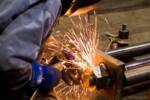Greg's FAQs
Manufacturing Lead Times
What is "lead time"?lead time | Noun /ˈliːdˌtaɪm/ The time between the initiation and completion of a production process. A common question our estimators field from prospective customers is, “What is your lead time?” Before we answer this question, let’s first address the term “lead time.” The dictionary defines a lead time as the time interval between the... Read more
Thread Pitch for 1-5/8″ Bolts
What is the Unified National Coarse thread pitch for a 1-5/8” diameter bolt?Currently, the American Society of Mechanical Engineers (ASME) specification B 1.1 does not define a “standard” Unified National Coarse (UNC) thread pitch for 1-5/8” diameter bolts (or 1-7/8” for that matter). The “pseudo standard” coarse thread that is often used in the industry is 5-1/2 threads per inch. The 8UN (eight threads per inch) series... Read more
F844 Standard Washer Certifications
Do ASTM F844 standard flat washers come with certification documents?Commercially available ASTM F844 washers are typically not accompanied by certification documents, even though the F844 washers supplied by Portland Bolt are domestically manufactured. The reason mill test reports are not available for F844 washers is that there are no specific chemical or mechanical (strength, hardness) requirements for these washers. The only requirement is that they need... Read more
A307 Grade 36 vs F1554 Grade 36
Can the anchor bolts type ASTM F1554 grade 36 be replaced with ASTM A307 grade 36?This question was submitted by a Port Authority on the East Coast. Anchor bolts were supplied by another company claiming they met or exceeded the requirements of F1554 grade 36. As it turns out, they did not. Hi Greg, Sorry for being late to send you a clear copy of the Mill certification. Just to... Read more
How to Order Bolts
What information do I need to provide when ordering bolts or requesting a quotation to ensure that I receive the correct product?Have you ever gone to order bolts and haven’t known what information you needed to provide to ensure you receive the correct fasteners? Relax, because you’re not alone. If you don’t deal with fasteners daily, you may not understand all of the necessary information you need to provide to ensure that you receive the correct... Read more

Welding High Strength Bolts
Can welding be performed on high strength anchor bolts and fasteners?The short answer is that in most cases, welding high strength bolts is not allowed. In the fastener industry, the term “high strength” typically refers to any medium carbon or alloy steel which undergoes a heat-treating process to develop the strength properties necessary to meet the requirements of a given specification. These ASTM specifications include... Read more
Manufacturers vs Distributors
What is the difference between a bolt manufacturer and a fastener distributor?In the fastener industry, there are two different types of fastener companies… distributors and manufacturers. The following FAQ will address the differences between fastener distributors and bolt manufacturers and provide some insight as to when to consider utilizing each type of company for your fastener purchases. What is a fastener distributor? Fastener distributors serve a... Read more
Fastener Substitution Liability
What are the liability issues involved in substituting one fastener grade or configuration for another?Have you ever had a fastener company try to talk you into substituting A193 grade B7 all thread rod for F1554 grade 55 anchor rods, claiming it’s “better”? Have you allowed them to substitute an all thread rod with a nut tack welded in lieu of a headed bolt? These are scenarios that come up... Read more
Rolled vs Cut Thread Bolts
What is the difference between a bolt with rolled threads and one with cut threads and does a fastener with a reduced body and rolled threads meet ASTM specifications?Threads of a mechanical fastener, regardless of whether it is a headed bolt, rod, or bent bolt, can be produced by either cutting or rolling. The differences, misconceptions, advantages, and disadvantages of each method are described below. Rolled Threads Roll threading is a process by which steel is extruded to form the threaded portion of... Read more
Headed Bolts vs Rod with a Nut
Can a threaded rod with a welded nut be substituted for a bolt with a forged head?When a threaded rod with a nut is substituted for a bolt with a forged head, two issues come into play. When in-house mechanical testing was performed by Portland Bolt on headed bolts versus rods with a nut, both from the identical lots of steel, the rod with a nut developed up to 12% less... Read more

